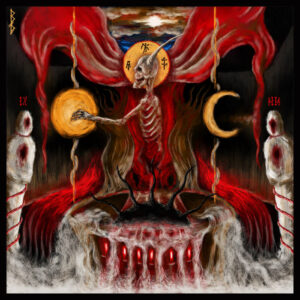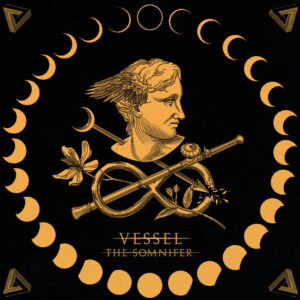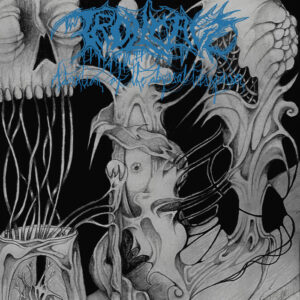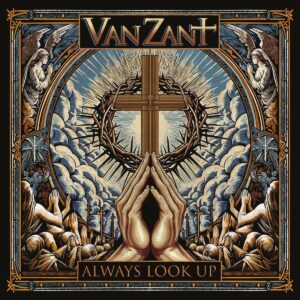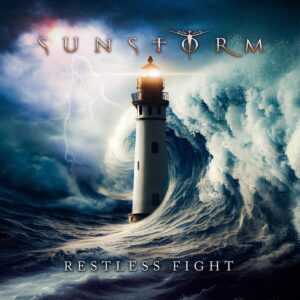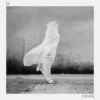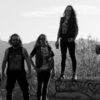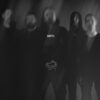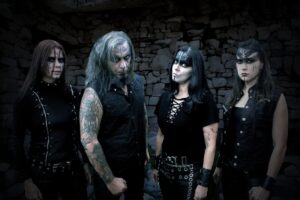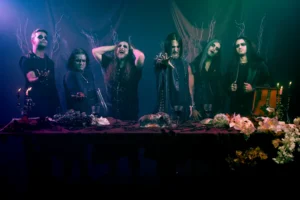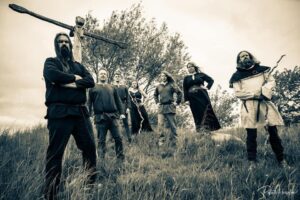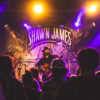Britta Görtz
HIRAES
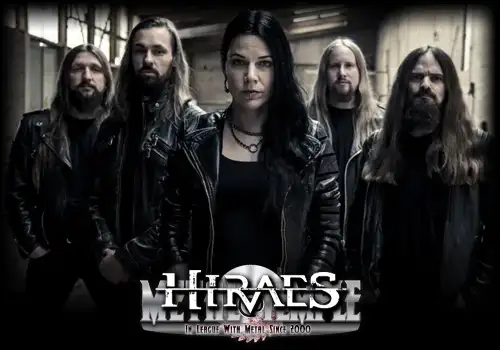
Britta: Thank you for asking. It has been a rough ride of course like for everyone. Fortunately, my family is healthy and no one got COVID. So, knock on wood that it stays that way. Almost everyone is vaccinated now and let us hope that this will pass by.
Britta: Yeah, I am crossing my fingers, because the numbers are slowly rising again. I think that we are pretty lucky throughout the whole pandemic in Germany. I mean, we have a very stable health system and we have good health insurance. If you are hit by a global pandemic, I am sure that they are far, far worse places where you can be on this planet. So once again, it showed us that it is a gift to be born here and nothing to be proud of.
Britta: It was not the very last show, but it was on the last leg of our last shows before the final show in our hometown Hanover. It has been a lot going on and to lay this baby CRIPPER to rest was really something tough to overcome. It turned out to be a good decision, because we parted as friends, which not every band does. We were lucky that we made the decision together to form this band, and we made the decision together to end this band. We all are in very good terms and see each other regularly. I had the band CRITICAL MESS in parallel to CRIPPER for around two years, I think. Then CRITICAL MESS continued, we wrote another record, and we played a couple of tours. I always wanted to have two bands again, because I really enjoyed my time in CRIPPER and CRITICAL MESS. It is like when you are always cooking with the same cooks and the recipe never really changes, you get comfortable and perhaps too comfortable. Being able to make music with so many different people is pushing you out of your comfort zone and you learn a lot as a musician. So, when the opportunity came that HIRAES is forming and I was asked to join the band as their singer, I happily agreed. Then we got signed to Napalm Records right away and what else can you ask for as a newcomer band.
Britta: We played the virgin cruise in 2011 and we played in 2014. Imagine, we came on this boat as the smallest band with the smallest following. We formed in 2005 and it was 2011 when we got on the boat. There were bands like EXODUS and TESTAMENT and everyone was standing in line waiting to get in. People came to our show and they liked us and even more came to our second show. Then in 2014, we had the best spot there on the pool deck and it was packed from the front to the back. Yeah, that was an event!
Britta: I would say it is like an old school Death Metal band with some modern influences.
Britta: Yeah, it happened. I do not know, I was thrown into that. There was someone I met on Facebook and she really was begging me for a long time to teach her. I was like: I can try, but I do not know if I can teach. Then I realized this is not even hurting, it is not like going to the dentist, teaching is actually fun. We have this music store here in Hanover. It is called PPC Music and they have an academy where people can try out new music, musical instruments, play guitar, and try out without any contracts just to dive into a topic. I started doing vocal courses there for harsh vocals and for growling vocals. More and more people came and it was always packed. Then I started to book something in Berlin and go there and book something in Munich and go there and now here I am: self-employed and make the most of my time by screaming and yelling at my computer.
Britta: No, I am an autodidact. It is difficult to have a vocal coach who certifies for that, because growling not being taught yet. When I started my self-employment, the German tax system is really complicated and as a vocal coach, you have to pay occupational tax. I had to prove to the German tax office that what I am doing is falling into this category and luckily I did, because I did a lot of research with people from universities. It is slowly starting to get recognized by scientists and this way of singing is not new, not even Metal invented it. We are using it in popular music and not just in some traditional music. It is slowly starting to find a certain vocabulary, to find certain technicality, and to see where it overlaps with other singing strategies. For example, classical singing training is really, really close to what Metal singers do.
Britta: I have no idea since I did not go through the process of the whole learning thing. There is also a lot of money involved to get the education and I have had many educations in my life, but no classical singing training. I do not have to have it to call myself a vocal coach. I would have to get licensed if I was teaching at universities or music schools, but since I am self-employed, I can just coach people.
Britta: I just started from my childhood and I probably never stopped because the first thing you do when you come to this Earth, out of your mother's womb, you scream. So, it is the one thing that everyone can do right from the start. Then the teachers and parents come in and say: be quiet, be quiet and you forget how to use these folds and everything that is in your throat which can produce these noises. As a metal singer at the very beginner's level, what you do is yelling without hurting yourself. You use the same folds, like the fold cords or the cartilages and you rattle and make noises with them. You will learn how to do this in a way that is a well-balanced clockwork in your body. The same as it was singing when you sing loud. You do not yell. You sing loud, because you use all your resonance room and this is exactly what we try to do as Metal singers. It is like controlled screaming, screaming with purpose, screaming with a technique.
Britta: There was no course and there was no YouTube when I started. When I joined CRIPPER, I just grabbed the microphone and screamed. At this time, I made every possible mistake and I learned from my mistakes. What I am offering my students is more or less just a fast lane like: when you do that, this will happen; if this happens to you, this is the mistake and this is how you tackle it. It is all from my experiences. I can try to teach my students something in a month that took me maybe six months because I did not know what I was doing.
Britta: I would say that the best advice that I can give any singer including myself is to find your very own voice and try to let your voice be the guide in your vocal approaches. When something is given to you as something that you can do easily: go with it and start working there. There is really no use to say something like: I want to sound like this guy, I want to sound like that girl. There is only one you and it is your very own instrument, very intimate inside your body, you cannot even see it. When you try to unfold your own vocal abilities, it creates very emotional singers and this is what we want to do. We want to reach people with music and touch them, or give something to them, let it be Metal or Pop, it is all the same. You want to create something that people can relate to, or to put some emotions out there, just to throw a ball and you want someone to catch it. So, the more authentic you are as a singer, the more that makes you a good singer.
Britta: That is a super interesting question. I have learned for myself on this journey doing the first record with HIRAES that the first big difference is the role the vocals or the vocalist has in this musical genre. When you think of who is taking the lead in a song, the more melodic the music is, the more it is leaning towards vocals and guitars. The harder and heavier the music gets, for example in Deathcore or old school Death Metal, the more it is all percussive, even the bass is played in a percussive way. As a vocalist, you are not so much the deliverer of the message, you are more somewhere in between the guitar and the drummer. You are more on the same level perhaps as the bass player as far as keeping the music together. As you go into the more melodic stuff like in melodic Death Metal, the guitars and vocals are on the same level as far as being the leading instruments: they have these big melodies on the guitar and then the vocals join on to that. Then there is the Pop music where the vocals are, for the most part, the most important instrument and everything else is sacrificed for. It was interesting for me to find my spot there, so that I can serve the song and that I can find what the song needs and not to put myself into a position where words are destroying the song. This is one thing. Then the amount of lyrics that I write for a HIRAES song is incredible. There are vocals everywhere. When I got the demos from Lukas [guitar] and Mathias [drums] and I wrote the lyrics, Lukas was like: can you do vocals also here and there, and I was like: okay, when am I breathing? I think one large breath at the beginning of a HIRAES show and then I go on [laughs]. In addition, I would say that I make use of my guttural low end to about 75% and then add another 25% of my high end, plus a couple of pig-squeals in CRITICAL MESS. In HIRAES, I am adding more of my mid to high range and then add a little bit of salt and pepper into it. This is just where I am leaning towards to. It is funny, like for my dad the Metal genre is one big thing. It is music that he finds really horrible or not so horrible, that is his definition of Metal. He would not be able to make out differences, but for a vocalist or also for an instrumentalist, it is so different to serve a melodic Death Metal song or a Death Metal song, which is funny.
Britta: That is a very good question. I would say that, as long as something is very new, it feels more challenging. Although I thought that it would be harder for me to write for HIRAES than it was in the end. The riffs of Lukas triggered just the right spot in me. We could not write together because of the pandemic, so I got the demos and I just cranked up the volume in the rehearsal room, grabbed my microphone and sang gibberish to it. Then all of a sudden, I had a melody, I had a phrasing, I had words, and it all developed very naturally. I was lucky that I was able to do that. Sometimes, the challenges are very different. The challenges in CRITICAL MESS are probably trying to keep a song together that consists of many different parts, maybe not even a chorus, and then to make something click for the listener. In HIRAES, Lukas write songs that have many tempo changes in it. So, I tried to build bridges in a way that you are not thrown off by the rhythm. This is something that I feel like I need to take care of with my instrument. So, the challenges are different. I was nervous writing the first two songs for HIRAES and then it was like just rolling, rolling down the hill [laughs].
Britta: It played out a little bit differently. Lukas wrote me an email and he said that he was thinking about starting a small musical project and he always liked me as a vocalist. So, if I am interested in another musical project and can make the time, maybe I want to listen to it. I knew DAWN OF DISEASE, we played a couple times together, shared the stages, and I knew all these guys from beer chats. I said as long as I like the music, I am always interested. Then we talked on the phone and he told me the news that DAWN OF DISEASE had planned their final shows and that the four instrumentalists were planning to form a brand new band. They could not send me any music, because none of the music was written yet. Everything that was written for HIRAES was just was written while we were all five of us together. We wanted then to meet for a rehearsal, but we could not, because the pandemic came. After a couple of months, we started to write a song and just sent it each other some files. Then the first song that we wrote together without ever meeting in a rehearsal room was "Outshine" and with that song we approached Napalm Records, because they were very curious to hear about that. They asked us to send us all the demos we had. Then we just kept writing. After the first song was written, we met the first time and jammed the song in May 2020. This was the moment when we were in the rehearsal room, we started the song, we played it, and we looked at each other. It was just like: this is the band, this will happen. The chemistry was great right away. We were all having fun and felt good. On the parking lot I said that I am going to tell my guys in CRITICAL MESS that I have a second band. I will tell them, and after that we could call it this a band and then we look for a name.
Britta: Usually, I say first come, first serve, but it is different if there is something like touring versus a small, single show. For example, one band has a single show in a small town, somewhere in Germany and then there comes a tour offer for the other band, which is a bigger tour to play in Europe. Then we will sit and talk and I am pretty positive that this will always go in favor of the tour, because everyone knows how rare that is and how much planning it needs. We actually had that problem already. There was a not announced show for CRITICAL MESS and a not announced show for HIRAES that would have collided if there was not the pandemic. I would have just carved a gap into the tour and we would not play that one show. Then I would have to fly over to play the other show, because it was an important single show, and then go back to the tour. So this is something that you can plan, but you know with this pandemic, I would love to have the problem of colliding [laughs].
Britta: We got overwhelmingly positive response. I had no idea of how the record would be perceived. Neither of us had, especially with us not being able to tour in a big manner. We have offers on the table, but they are like on hold. Of course, it is the best thing that can happen to us. I think we had like two or three mediocre reviews, but for the most part, they were in the upper third or even top range, like 9 out of 10 or 8.5 out of 10. So, it was overwhelmingly positive received by everyone. In addition, we run our own online shop and we see how many orders are coming in. It is quite a lot and it is really cool that people support the hell out of new bands when they like them, despite not being able to go into shows. So, to make sure that they keep the fun alive and come back once the pandemic is passed, we could not be happier. It is funny that there are so many songs on this album that have been named as favorites. It is almost spread evenly and there is no leftover song that has not been named. It feels like this must have been a record that people needed. I also feel that I have not gotten more positive feedback on my lyrics ever before. People are really diving into the lyrics deep, maybe also because it is melodic and it is so prominent in this music. When I wrote the lyrics, I thought this is really dark, like: do I really want to serve people in the pandemic with these kind of lyrics just like hang yourself in your attic. I am not going to do that. So I tried to write from a perspective where something bad has happened, but you can see the light at the end of the tunnel and you are going to make it, but you are not there yet. There are still obstacles, but there is the light and if you walk straight towards that, you are going to be good. This is something that I tried to imprint into the lyrics and for some reasons, it just blossomed and people are coming to me like: thank you for the lyrics in this song; thank you for that song. Wow, that is cool. That is so satisfying as an artist, that is so satisfying. No money could pay for that! Awesome!
Britta: Right [laughs]
Britta: For some reason that I do not know, there was not a lot of comparison to DAWN OF DISEASE from fan side. Of course, it was a topic in every review, because it is more interesting to read a little bit of the story of the band and to get people's attention to read the review naturally, but from fan side I have not heard any voice which said: I was a fan of DAWN OF DISEASE and the new one is crap. Nothing like that. There was also nothing really on the positive side like I loved DAWN OF DISEASE and I love HIRAES, it popped up maybe once or twice, but I expected it to be more expressed to find that comparison from fans. That is almost not happening.
Britta: Many of them just went berserk over the new stuff, especially the old CRIPPER fans. I would say that HIRAES is definitely the most melodic musical environment that I have put my voice on, but I have read from CRIPPER fans who also came over to CRITICAL MESS and embraced all my bands that they love my voice on the HIRAES album and that they feel like that I have now two bands where I can show my strengths. I read CRIPPER and CRITICAL MESS in many comments from fans where they do not make comparisons between the bands, but they talk about the vocal approaches of the different bands. This is amazing for me to read from an outside perspective, because I have only my perspective. I know my development as a vocalist and it is really interesting to read how people think about that. We played two live shows in front of a real audience with HIRAES two weeks ago and I saw CRIPPER shirts, HIRAES shirts, and CRITICAL MESS shirts. It was really like a family [laughs]. I ran into a guy who I saw last time two years ago on a CRITICAL MESS show and he must have lost something like 90 pounds or so. He was still wearing a big tank top and it did not fit anymore, it was just like someone has carved something out of this guy. It was really cool to see some familiar faces in this new environment. That was really cool.
Britta: Yes, we played in Frankfurt and in Munich. That were seated shows with beer benches and stuff like that. Our first show was the Metal Frenzy Open Air streaming edition with no audience present. So you do not know how people perceive it, because it was our first show. Then we played to support shows with LACRIMAS PROFUNDERE.
Britta: How was it?
Britta: When you are on the 70k cruise, you are seated in this indoor theater and you have your popcorn and someone is handing you rum and coke. Then you say that this is how you enjoy a Metal show. Now you sit in your comfy seat and it is not good enough. I think it also depends on how you present it. I mean, if you have benches and you sit there, it is very stiff and that is very German. They could just make a big happening out of it and put nice seats out, have like big popcorn machines there and celebrate it more like when you would go to see movies., I did not expect anything from these live shows for HIRAES, because I felt the LACRIMAS PROFUNDERE audience must be very different and they are not used to someone screaming all the time, but they were so happy. We entered the stage and I looked at these people, bright sunshine, a hot day, and it was the first live band for many people which they saw in two years. I could see their faces, it was almost like giving water to someone very thirsty in the desert, a sponge like: oh, it is live and it is loud [laughs]. If people do not turn up, maybe they are also careful, they are not used to going to shows and they are uncertain of how to behave now with the stupid Delta and Lambda variants are coming up. Maybe they just do not want to push it. The thing is, you can never punish the people who show up for the people who did not. So as a band, it does not feel stupid. What hurts me is that the venues are on the edge financially and they might close or so. I could even understand if the ticket prices would skyrocket. I really hope that the venues are still there, once this is kind of over, or livable.
Britta: [laughs] No, but if she called me, I would invite her over. I have not seen her for ages.
Britta: [laughs] Why not? She is doing a great job for ARCH ENEMY.
Britta: I asked myself the same question. I mean, I cannot speak for Lukas. He was the last main songwriter for DAWN OF DISEASE and he is the main songwriter for HIRAES. So I do not know what is coming out of his brain and fingers, but when I hear him speak, and I hope I say that correctly, he felt released writing for HIRAES. He felt that the writing for DAWN OF DISEASE, because of their history and where they were coming from, had their limitations and restrictions as far as for which risks would fit the band. Starting new and fresh with HIRAES gave him the opportunity to write without having to fulfil expectations and to continue with something. I think that might have been a relieving situation where he was pouring everything into it what he had in himself. I am sure that he will continue that way, but what will be in him once this is released, I have got no idea. I have wishes and hopes, because there are definitely sides of the record that I find very, very interesting and I would like to lean more towards that for the next record. I know that Lukas is already writing, but I am not going to touch that. He is such a great songwriter, so I would just like keeping my mouth shut and wait what he delivers and try to carry that to the finish line with the others. I do not know, I would say that I am probably more drawn to the darker, more mysterious, dragging things, where words are getting really dark. However, I would just be as surprised as you. [laughs]
Britta: It works great [laughs]. Seriously, we are not living together in the same city. We are spread across the Northern part of Germany, so jamming in the rehearsal room is not an option. The songwriting starts with Lukas. He is the focal point of songwriting in HIRAES and he is a riff machine. He writes riffs and he loosely arranges them. He writes what he feels could be a verse, what could be a chorus, and then he sends it over to Mathias our drummer. He also adds little ideas for drumming where he feels this could be for example a blast-beat, then he adds the drums. Then we have our first demo and I get it. I go over the structure and I try like throwing noodles to a wall and see what sticks. As I said, I go to the rehearsal room, crank up the volume and I just sing gibberish to it. Then I find some words and phrases and this is like the grain of sand where I try to make a pearl out of it in a way that it becomes something presentable. Sometimes, but not very often, I was asking Lukas to change some parts around, to lengthen or to shorten something, or maybe this is a good point for a solo. He welcomed the ideas, we talked about it and many of them made it onto the record. We just go back and forth at this point. After the songwriting is done, Mathias laid down the correct drums and made a premix. Then the guitars were added on top and I came in and did my vocals. Everyone worked in their own home studios for recording. The guitarists and bassist did that together, since Oliver [guitarist] has the best studio of them and they recorded the stuff there. Then we sent everything over to our producer Jens Bogren and his team at Destination Street Studios and he created his magic with his team. And now we have the record. Wait, then there is Jojo! That was a funny and very interesting process, because everything which you hear on atmospheres and the orchestral things is not part of the writing process. We had to imagine that and the guys could imagine that, because they have worked that way in the past. I have never had any keyboards or atmospheric things before. After everything was done, written, and recorded, Jojo came in. He is a good friend of the band and he did all the keyboards and all the atmospheric stuff that you hear on the record. That made the twist of the key for me, it was like: yeah, I understand that now, I feel it now.
Britta: I actually do not know how it was working with him, because unfortunately we were in a pandemic and I have worked with Jens Bogren without ever talking to him or being in his studio and I am very sad about it [laughs]. Well, he did the first two songs and he laid down the overall sound of it. Afterwards, one of his team guys took over and did the rest of the songs. Afterwards, he did the master again. I think he did a superb job as we expected, because in melodic Death Metal the first name that comes to your mind when it comes to mixing and mastering very successful albums, it is him. This was the first production where I felt that the handling of my vocals were completely different to what I am used to hear in a production, but I felt very comfortable with it. It was incredible. I even thought that the vocals were a little bit too loud which is really funny, because normally it is not loud enough. At this time, it was perfect. I sent over a bunch of vocal tracks that I had, I did some overdubs, I did some harmonics and everything with it. I said to him to throw away what he does not need and just do what he wants to do. It was amazing, it was great. For the overall sound, I feel he has a great feel for balancing out his idea of how it should sound and what fits the atmosphere on the album. It was like a polishing process and he enhanced our strengths with the mix. It does not sound overproduced, unnatural, or like it is a different band. We were definitely happy with that.
Britta: I did not know that I had this. I mean, I do not want to call it talent. I just had a feeling that I should just trust the process of writing and it is not a really active part. Sometimes I write something and I do not know how I did it. Whenever that happens, I am really happy and when it happens, it is easy to sing. The more forced the writing is, the more forced and unnatural the singing sounds. So that was an easy part. I only struggled with one song on the album which I threw away completely and I started from scratch, because I did not like it. I think with the material that I delivered to Jens Bogren to work with, I did a good job. He had enough to work with that and he found a great spot in the whole music where it neither did go under nor it was over prominent, and I am very happy with that.
Britta: We have ideas and then we hire a company. We worked with three different teams, a different team for every video. The first video for "Under Fire", we shot in August 2020 already. It was the first song which was ready and the guys had ideas like: we need pyros, we need flames, we need everything. So they organized pyros and flames and everything. Luckily we have our lighting guy who keeps all his stuff on a big outdoor area where we shot it. We had to inform the local fire department, the police, and the local press, because it is a big fire and then it is actually not a fire. You could see it from the street, you could see the flames covering and it was so much fun to shoot. I have never shot with pyros before, it was very hot, but you get a good feeling for it to know where the flames come. We only had five rounds of shooting, because it is very expensive for gas and we had skyrocketing high flames there. You kind of know when they come and then you can interact with them. It is really a lot of fun and I hope we can bring that to a festival stage maybe. Yeah the flames took over the show and that was very easy to film. We filmed the second video "Solitary" in Hanover in a hotel there. We were the only guests and the people in the hotel, were very happy that they had guests. They came like: do you want coffee? Do you want cookies? It was very cool. I sat down and I did the whole story development. One of the guys who filmed it is Jonathan from CRIPPER. We worked together on that, he has a video company right around the corner from where I live. I came up with the idea of an astronaut kit. Jonathan felt it is crazy, but really liked the idea. Then we put the whole story around it. We had the challenge to film the video not as a group, because band and crew would have been too many people in the room at that time of the pandemic. So we had to do single shots for the performance. For the hotel scenes, it was a tiny room and you have to have some crew people in there. That was challenging, but we took it as a chance to think of a video idea in a different manner and this is what came out. The last video we shot with great crew of Gup.Media. We went on that stage where we were also playing for the Metal Frenzy Open Air streaming edition. Friends of mine own it and we had all the time in the world to prepare our live show and our lighting guy came in and he made this amazing light show. We wanted to give the people an idea of how HIRAES will look like live without having the opportunity of playing live. We said okay, big stage, big everything, the feeling of us rolling in the suitcases, so the audience would have a feeling for who this band is and how they interact with each other. I am so happy with this video, it felt great during filming; it felt great with the light and everything. It was just a jaw drop, I did not expect that, it was really a surprise for me. I really like it.
Britta: You can look at it from two sides. It occurred to me the other day, how lucky am I to be an artist and being able to create something right in the middle of the pandemic without being able to reflect on it afterwards. I cannot wait to look back on that record, say fast forward 10 years. That record will always be the record that we created in the pandemic and it has imprinted the feelings that we had independently, because we wrote it, they are imprinted. I am really curious about all the albums that will come out now, there is a wave of albums coming out that were written, recorded, and produced in the pandemic and I cannot wait to compare it to the former releases of the bands. This is really an exciting time for doing things differently and also to become better at your instrument because you do not have to go to shows, you can sit at home and try it out.
Britta: It is "Solitary".
Britta [laughs]: I do not know. It is a song that is very personal regarding the lyrics and I was able to transform something really bad that was already moldy in me into something good. This song is giving me so much strength when I sing it to myself that I hold on to that song.
Britta: Cool! Why?
Britta: I think that it is our most popular song on Spotify, The other songs are popular too, but there is a significant difference to the other songs. I do not know what is going to happen, I am going to be happy with everything that we are going to ride, but when we played our first two shows, I felt we need a couple more of these songs like "Solitary" to fill a longer set than 45 minutes. Let us move fast forward into the future again and imagine HIRAES is playing a two hours headliner show and then you have melodic, melodic, melodic, songs. It would get boring, because even if that are all strong songs, it is repetitive. So you need a couple of different songs.
Britta: MR BUNGLE, VEXED, and I would interview Dickie Allen from INFANT ANNIHILATOR. It would probably be goofy interviews, well, at the very least MR BUNGLE and Dickie Ellen would be very goofy interviews, I suppose. I invited Megan Targett from VEXED to my next Tavern Talk. She raises ducks which is weird. I would like to do an interview with members of all three bands and then I would just throw a word at them and let them talk about it.
Britta: Just to remind you whose idea it was. Invite me if you have any one of MR BUNGLE there.
Britta: I would cover "Mouth To Mouth" by FAITH NO MORE. I would cover all uncoverable songs… I would cover "This Godless Endevour" by NEVERMORE which is a song I could never sing, but if I could, I would. Then I would cover "Killing In The Name" by RAGE AGAINST THE MACHINE, because it was so influential on me.
Britta: I have no idea. It is a question that I get asked a lot, probably any musician, but I feel like it is impossible to answer. The influences that made us, that made every one of us are like, kind of mingle together in something with your own and something you learn in school, from your parents, from your brother, or from your best friends, and it is impossible to lay a finger on it. I can tell you what I would like them to influence on me, especially those bands who have musicians who are in a way fearless. I wish that this would probably even rub up more on me, because I cannot say that I am a fearless artist. I wish I could say that. I really admire fearlessness when it comes to musicians, also when it does not work out, because we all admire bands who made it. IGORRR, for example, who in the world would have thought that this could work? Another example of a fearless artist is Billie Eilish, but these are the success stories. I know, for some reason that the chance will come in my life where I will get the chance of doing at least one fearless thing in my life with something that is just myself, nothing else, but I also need other people with that. It is really difficult to express. I do not play many instruments and can do everything by myself, so everything that you write together as a band influences each other, it has a certain overlap, and then you agree on playing like that. I have never produced music with someone who has a weird taste in music that I have. I have really weird bands. My Spotify told me at the end of 2020 that my label is genre bender, because it is really weird. I will get my chance to find something that is so experimental and unexpected, but not in HIRAES and not in CRITICAL MESS.
Britta [laughs]: Yeah. I do not mean that I am a fearful artist, but you probably know what I mean. To really take a risk, you have to have something that you can risk and I do not know, it is not there yet. I need to get a lot older before I can do that.
Britta: Yes, but not with our own songs. This is not fearless, that was just funny. We interpreted pop songs in Death Metal and some German celebrities had to guess which song it was. We rehearsed that and then there was someone coming down into our rehearsal room from upstairs like: Are you alright? What is going on? Of course we could not talk about it. We had to prepare seven songs, but just five were played in the show. That was "Backstreets Back" from the BACKSTREET BOYS, "Nothing Compares To You" taken from the version of SINEAD O'CONNOR. Then we had "Do You" by a German boy/girl band called BRO'SIS from the early 2000s. We had "Blinding Lights" by the WEEKND, we had "Remmidemmi (Yippie Yippie Yeah) by DEICHKIND and that was a superb song to put into Death Metal. We were not even the first band to cover that in Metal though. It was so much fun to play those songs. I mean the BRO'SIS song alone had six singers and I could do it including the rap part.
Britta: My favorite three Metal vocalists are Dickie Allen, because he impresses me with his vocal abilities, they are mind blowing. Then Warrel Dane of NEVERMORE, and I cannot say anything about the person, but I love Phil Anselmo's vocals a lot. My other three favorite non-Metal vocalists are Mike Patton, Björk, and Billie Eilish who is my absolute favorite vocalist and by far bigger than any Metal vocalist in my heart.
Britta: Oh, I am not good at that. I really do not know where bands are coming from. I was thinking rather about the disciplines…
Britta: Yeah, I know that those come to mind, but they would not lead the Heavy Metal, come on. Who wants to see these old guys? At Olympic Games, you want the young and fresh ones. Okay, they can present the medals, but they are not allowed to participate anymore.
Britta: Metal has the old guys, that is true, but there is still young talent around and it is coming up. There is a few older stuff and then there is this big bulk of new stuff.
Britta: No, definitely not. If you if you put these bands together, I think they are really close together, because within the genre of Heavy Metal they all have their own niche. They have their really well deserved point where they are in their career. It is just that I do not expect any surprises from these bands and maybe they should not surprise us, because they are the anchors that everyone holds on.
Britta: No, GODSLAVE, that is an easy pick, because they just recently put out a new record. It is an amazing record and I love the topic they pick, I love the artwork, and it is just my favorite Thrash Metal record today.
Britta: They would be the underdogs, and then they would just pass by everyone else on the outer track to go on top. Although, OVERKILL is always hard to beat, because Bobby is a tough nut, but I think the young guys would do it….
Britta: Would they still start for Brazil? Before the GODSLAVE album came out, I would definitely sign that up. Let us say, they are a very potent contender.
Britta [laughs]: Why is that easy?
Britta: I really cannot say: "Of course it is CRITICAL MESS". We like to joke around and we reinvent our band name like Criminal Jazz or Critical Chess, something like that. Really I listen to so many Death Metal bands and most often, I do not know where they really come from. No, I do not want to name CRITICAL MESS.
Britta: How about DEFEATED SANITY? You should watch out two bands now which will put out albums soon. One of them is renamed and the new name is RISE OF KRONOS and the other one is VIROCRACY. They are in the studio recording and what I have heard so far that the album is going to be brutal. So, you should definitely watch out for those. They could be some underdogs in our Metal Olympics.
Britta: It helps a lot. I was surprised to learn about that. In early 2020, I was at the Wacken Music Camp for two weeks in Bavaria, and there were about 50 kids and a couple of coaches, people from extreme Metal bands that were helping the kids writing songs. There were also producers and everyone was creating songs, playing songs and stuff like that. I went there and thinking that I need to look at all the shirts that these young guys are wearing in order to learn about new bands that I have missed. So what did I find? I found all the old heroes. It occurred to me on that day, that the parents grew up with Metal and they are the first parents that grew up with Metal, then having kids in an age where they start to play in Metal today, because if you are a parent and you grew up in the 70s or 80s, you have kids being now in the band entrance age. So, these kids were born into that environment and grew up listening to Metal. I was born into a non-musical environment at home, and the most musical person around me was my brother. He is 10 years older than I am and he was listening to Metal music, and that was the first music that I listened to on a continuous basis. So, he got me into Metal. I cannot imagine how cool it is to have parents who go to festivals, who go to live shows, and who introduce it to you as being something that is just normal on a cultural level. I think it is super important that these bands are there to influence the younger generations.
Britta: Yeah, but they have been continuously putting out records, and they are working by staying true to themselves. I also hear a lot about that the metal audience has gotten old, but this is the first time that the audience has the chance to get old, because metal is a young genre. You look at old pictures from the 80s and everyone was young, because Metal was not old. I think it is very cool to be in an environment that has something for all people, where generations come together, where nations, generations, and anyone can participate in. This is something really nice. Metal does not feel exclusive, it feels inclusive. This is something that I really miss on top of the feeling of standing in front of a stage and watching out to my favorite bands or being on stage, especially at the big festivals where so many people meet. I miss the international mix and influence where everyone is coming from everywhere, and you see the Brazilian flag here and a Japanese flag there. Then you meet and join people who you only meet every year at your favorite festival and your international friendships evolve. This is just something really wonderful and it is so precious…and now we know why…
Britta: That is cool. When I was on the cruise, I met a group of Colombians and they brought me a little gift from Colombia with some treats in it. They had seen us the first time we played there, and then they saw us the second time and brought gifts for us.
Britta: My future wishes are a little bit parallel to my future plans. My wishes are playing, playing, playing and my plans are music, music, music. Whatever that may bring. I know that I need music in my life, now more than ever. I have worked on so many collaborations and put out a record. CRITICAL MESS is writing and HIRAES is writing again, and if we can play, I want to produce. So my future plans are to keep doing music and being an active part in the Metal world.
Britta: Both bands have tours lined up. There is a not announced tour for CRITICAL MESS which I cannot talk about. It has just been pushed back again from October to whenever. Then we have an announced tour with ATHEIST in February where we hope we can play. It has also been pushed a couple of times. We have one announced tour in early 2022 with HIRAES and 1914. Then we have another tour which is in the planning/idea status with HIRAES which I cannot talk about. This would be end of October going into November 2021, but I do not think that any of this will happen, unfortunately. We will focus on single shows. With HIRAES, we will support LEGION OF THE DAMNED in Germany. We were just confirmed for a show in Munich with CRITICAL MESS that will be announced very soon, I just received the flyer a couple of hours ago. We will focus on that and try to play as much as we can. Then we have a show here in Hanover in October with CRITICAL MESS as well and I am positive that this can happen. This is only with bands who have a short way to travel.
Britta: One thing that comes to my mind is that this is one of the most enjoyable interviews I have ever done. It is so nice to speak with you and answering your questions. What you are asking feels like a really cool conversation and I feel really good talking to you. Thank you for that! It has really been a pleasure. If anyone who is reading this interview is into melodic Death Metal, definitely give HIRAES a listen, give it a spin. Perhaps from a musician's perspective, when bands cannot play and this is not only for HIRAES, they crave and they feed from friendly comments of their fans. So even if it is just like the same comment under every post, or a music recommendation, or just like: thank you for playing that song. People read this and musicians read this. At the moment that is the only feedback which they get. Usually you are on stage and there is a mutual energy which rolls with the people in front of the stage. It feels weird not to have it, so bands read fan comments and please keep them coming for all bands.
Britta: Thank you very much.

More results...
